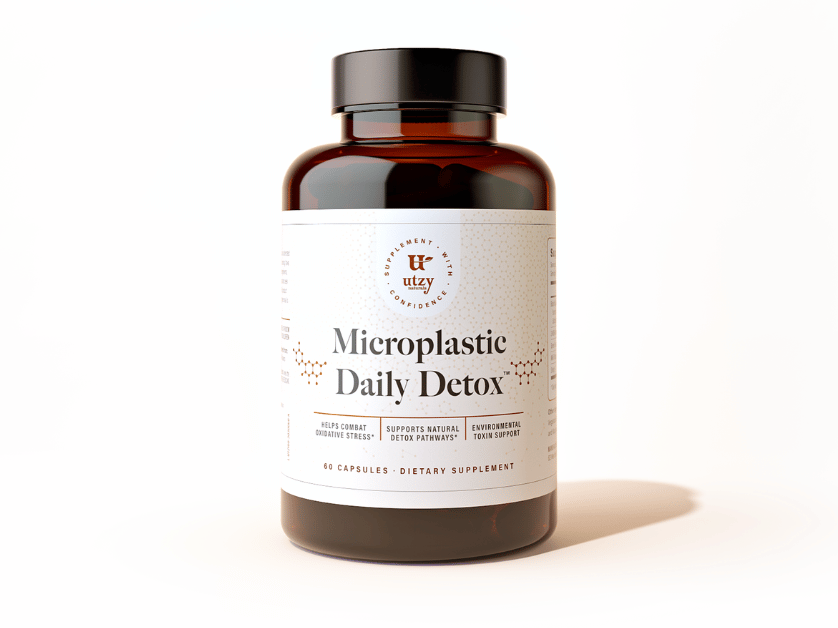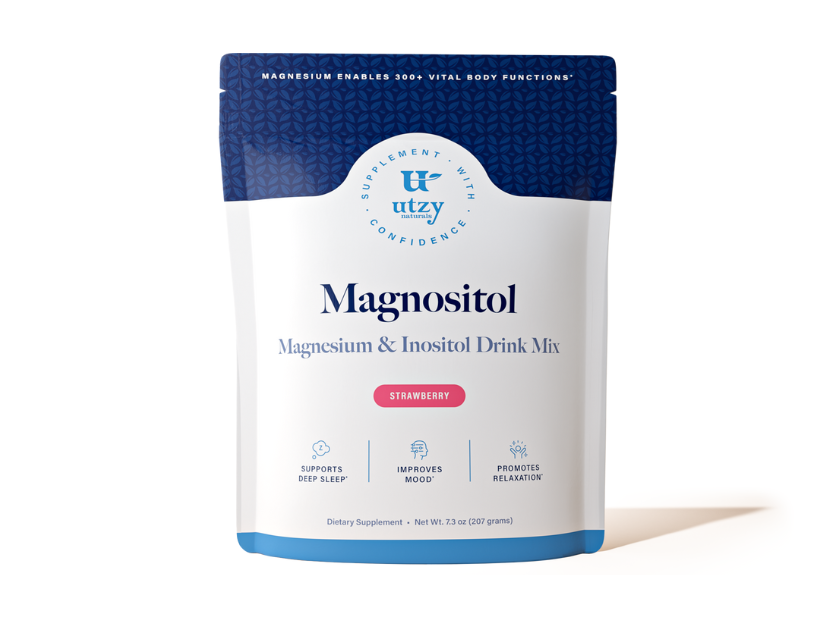shop
learn
The 8 Benefits of Magnesium
February 25, 2025 6 min read
Magnesium is a mineral that is important for overall health.
Our bodies are not able to create magnesium on their own, so it must be consumed through diet. Unfortunately, only about ⅓ of Americans consume enough magnesium each day [1].

What Is Magnesium?
Vitamins and minerals are essential for optimal health.
There are 16 minerals that the body needs through our diet. We need some minerals in large amounts (macrominerals). Others are needed in smaller amounts (trace minerals) [1].
Magnesium is a macromineral and the fourth most common mineral in the body, behind calcium, potassium, and sodium [2].
In the 1600s, magnesium was discovered as "Epsom salt", which we now use for relaxing baths. After its discovery, it became widely used for supporting health and longevity. [2].
However, at that time, much was unknown about the wide number of important roles that magnesium plays in the body. Magnesium supports several bodily processes that are necessary for everyday living.
Some of these processes that magnesium helps support include [3,4]:
- Energy Production
- Protein Production
- DNA and RNA Production
- Muscle Contraction
Benefits of Magnesium
Magnesium supports the body in many ways. Below are the 8 primary benefits of magnesium.
1. May Protect Bone Health
Magnesium is one of the most prevalent minerals in the body with 60% of it found in the bones [5].
Magnesium is a co-factor for vitamin D, meaning it helps to create and activate it. The presence of vitamin D is important because it absorbs calcium.
Low magnesium can lead to deficient levels or ineffective use of vitamin D and calcium.
Therefore, making sure you have optimal vitamin D and magnesium levels will help ensure long-term bone health.
2. May Improve Mental Health
Magnesium affects the brain in many ways. One way it does so is by helping to regulate the hypothalamic pituitary adrenal (HPA) axis.
The HPA axis controls stress. Low levels of magnesium can cause an increased level of stress. Taking magnesium may help to reduce HPA axis activity, which reduces overall stress levels [6,7].
Magnesium can also help your brain to relax because it supports the role of the neurotransmitter, GABA, in the the body. GABA is known for its calming and relaxing effects [9].
3. May Support Healthy Blood Sugar Levels
Magnesium also supports healthy blood sugar levels. It plays an important role in helping cells utilize glucose (sugar) from our food in an effective way. This process keeps glucose from staying in our blood longer than needed after eating, resulting in stable blood sugar levels [4].
Our bodies also use insulin to help lower our blood sugars after eating. A magnesium deficiency can cause a problem with insulin’s ability to lower blood sugars [4,10].
So make sure to maintain optimal magnesium levels, that way your body can manage healthy blood sugar levels.
4. May Support Healthy Blood Pressure Levels
Magnesium affects blood pressure due to its role in muscle contraction.
Blood pressure rises when blood vessels contract and it falls when they relax. Magnesium is able to keep blood pressure low because it prevents blood vessels from contracting when they don’t need to. [4].
One study analyzed a number of human trials assessing blood pressure and magnesium. A link was found between magnesium supplementation and decreased blood pressure levels [11].
5. May Support Heart Health
Magnesium impacts the heart in a positive way as well.
Low magnesium levels are connected with high levels of inflammation, excess cholesterol, and high blood pressure. Adequate magnesium levels are known to support heart function [4,12].
6. May Improve Exercise Performance
Magnesium impacts exercise in many ways. This is due to the fact that magnesium plays roles in energy production and muscle contraction.
Animal studies shed more light on how magnesium improves exercise performance. Magnesium has been shown to help prevent muscles from getting tired sooner than desired. Also, it can ensure that that body has enough energy during exercise [14].
Humans studies show that magnesium can improve different exercise performance measures. Strength and jumping performance are two that can improve.
In elderly women, supplementing with magnesium helped improve their strength training. Also, magnesium may assist in muscle recovery, which helps athletes in rest periods [14,15].
Other research shows that low magnesium levels can hinder athletic performance. Endurance, strength, and energy during exercise are negatively affected due to a deficiency [14,15].
7. May Reduce Neurological Pain
Neurological pain and headaches can be a common occurrence for many people.
Magnesium plays a role in the neurological processes that prevent pain. Thus, it can be a possible solution for preventing or reducing the intensity of headache pain [16].
Some research has shown that low magnesium levels are common among those who experience neurological pain. Supplementing with magnesium can help decrease the re-occurrence and severity of this type of pain [16].
8. May Improve Sleep
Magnesium can help promote better sleep quality as well.
Many sleep quality metrics are improved by magnesium supplementation. Magnesium has been shown to help with sleep duration, night awakenings, and daytime tiredness [17].
Magnesium helps balance inflammation and regulate circadian rhythms. Researchers suggest that this is why magnesium is so helpful in improving sleep [16].
How to Add Magnesium to Your Diet
Knowing the benefits of magnesium is beneficial. But knowing where to get magnesium is even more impactful.
Including foods high in magnesium can allow you to be intentional about your intake. Foods with the highest magnesium content (from greatest to least) include:
- Pumpkin seeds and chia seeds
- Various nuts (including almonds, cashews, peanuts
- Veggies like spinach and potato (with skin)
- Brown rice
- And plain yogurt [3].
In addition to eating a balanced diet, taking Utzy’s Magnesium PM Sleep Drink Mix can help you to get more magnesium in your diet.
This formula is paired with other nutrients that help you to relax and sleep better at night. Adding this to a glass of water or cup of tea is perfect for winding down at the end of the day.
Conclusion:
Magnesium supplies a wide variety of benefits for you body. This is largely due to the many processes it is involved in, from DNA production to muscle contraction.
Eating a diverse diet, rich in plant-based foods and using a high quality magnesium supplement is the best way ensure you’re getting enough magnesium.

Natalie Kravat, RDN, LDN, MS is a registered dietitian that is devoted to helping others find a love for healthy eating as well as being successful in reaching health goals. She has a passion for using whole foods to create delicious and convenient recipes and teaches others to use their creativity to do the same!
References:
- Dahl, W. L., & Turner , R. E. (2022, May 10). FACTS ABOUT MINERALS. Retrieved September 28, 2022, from https://edis.ifas.ufl.edu/publications
- Ismail, A. A., & Ismail, N. A. (2016). Magnesium: A mineral essential for health yet generally underestimated or even ignored. J. Nutr. Food Sci, 6(2), 1-8.
- U.S. Department of Health and Human Services. (n.d.). Office of dietary supplements - magnesium. NIH Office of Dietary Supplements. Retrieved September 28, 2022, from https://ods.od.nih.gov/factsheets/Magnesium-HealthProfessional/
- Volpe, S. L. (2013). Magnesium in disease prevention and overall health. Advances in nutrition, 4(3), 378S-383S.
- Rondanelli, M., Faliva, M. A., Tartara, A., Gasparri, C., Perna, S., Infantino, V., ... & Peroni, G. (2021). An update on magnesium and bone health. BioMetals, 34(4), 715-736.
- Boyle, N. B., Lawton, C., & Dye, L. (2017). The effects of magnesium supplementation on stress—a systematic review. Nutrients, 9(5), 429.
- Varghese, F. P., & Brown, E. S. (2001). The hypothalamic-pituitary-adrenal axis: a brief primer for primary care physicians. Primary care companion to the Journal of clinical psychiatry, 3(4), 151.
- Eby, G. A., & Eby, K. L. (2006). Rapid recovery using magnesium treatment. Medical hypotheses, 67(2), 362-370.
- Nielsen, F. H. (2015). Relation between magnesium deficiency and associated pathological changes. In Modulation of Sleep by Obesity, Age, and Diet (pp. 291-296). Academic Press.
- ELDerawi, W. A., Naser, I. A., Taleb, M. H., & Abutair, A. S. (2018). The effects of oral magnesium supplementation on glycemic response among patients. Nutrients, 11(1), 44.
- Kass, L., Weekes, J., & Carpenter, L. (2012). Effect of magnesium supplementation on blood pressure: a meta-analysis. European journal of clinical nutrition, 66(4), 411-418.
- Rosique-Esteban, N., Guasch-Ferré, M., Hernández-Alonso, P., & Salas-Salvadó, J. (2018). Dietary magnesium: a review with emphasis in epidemiological studies. Nutrients, 10(2), 168.
- Ho, K. M. (2008). Intravenous magnesium for cardiac arrhythmias: jack of all trades. Magnesium research, 21(1), 65-68.
- Zhang, Y., Xun, P., Wang, R., Mao, L., & He, K. (2017). Can magnesium enhance exercise performance?. Nutrients, 9(9), 946.
- Veronese, N., Berton, L., Carraro, S., Bolzetta, F., De Rui, M., Perissinotto, E., ... & Sergi, G. (2014). Effect of oral magnesium supplementation on physical performance in healthy elderly women involved in a weekly exercise program: a randomized controlled trial. The American journal of clinical nutrition, 100(3), 974-981.
- Kirkland, A. E., Sarlo, G. L., & Holton, K. F. (2018). The role of magnesium in neurological disorders. Nutrients, 10(6), 730.
- Arab, A., Rafie, N., Amani, R., & Shirani, F. (2022). The Role of Magnesium in Sleep Health: A Systematic Review of Available Literature. Biological Trace Element Research, 1-8.
Leave a comment
Comments will be approved before showing up.
Also in Health
Subscribe
Sign up to get the latest on sales, new releases and more …
Join the Utzy Naturals Club!
Sign up and get the latest on sales, new releases, and more...





